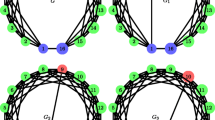Abstract
In this paper we present an approach for proving Θp supin2 -completeness. There are several papers in which different problems of logic, of combinatorics, and of approximation are stated to be complete for parallel access to NP, i.e.Θp supin2 -complete.
There is a special acceptance concept for nondeterministic Turing machines which allows a characterization of Θp supin2 as a polynomial-time bounded class.
This characterization is the starting point of this paper. It makes a master reduction from that type of Turing machines to suitable boolean formula problems possible. From the reductions we deduce a couple of conditions that are sufficient for proving Θp supin2 -hardness. These new conditions are applicable in a canonical way. Thus we are able to do the following: (i) we can prove the Θp supin2 for different combinatorial problems (e.g. max-card-clique compare) as well as for optimization problems (e.g. the Kemeny voting scheme), (ii) we can simplify known proofs for Θp supin2 (e.g. for the Dodgson voting scheme), and (iii) we can transfer this technique for proving Δp supin2 -completeness (e.g. TSPcompare).
Supported in part by grant NSF-INT-9815095/DAAD-315-PPP-gü-ab.
Access this chapter
Tax calculation will be finalised at checkout
Purchases are for personal use only
Preview
Unable to display preview. Download preview PDF.
Similar content being viewed by others
References
J. Bartholdi III, C.A. Tovey, M.A. Trick. Voting schemes for which it can be difficult to tell who won the election. Social Choice and Welfare 6 (1989), 157–165
M. Condorcet. Essai sur l’application de l’analyse à la probabilité des décisions rendues à la pluralité des voix. Paris, 1785
S.A. Cook. The complexity of theorem-proving procedures. Proceedings of the 3rd IEEE Symp. on the Foundations of Computer Science 1971, 524–535
P.C. Fishburn. Condorcet social choice functions. SIAM J Appl Math, 33 (1977), 469–489
M.R. Garey, D.S. Johnson. Computers and Intractability: A Guide to the Theory of NP-Completeness. W.H. Freeman & Company,1979
E. Hemaspaandra, L. Hemaspaandra, J. Rothe. Exact Analysis of Dodgson Elections: Lewis Carroll’s 1876 Voting System is Complete for Parallel Access to NP. JACM, 44(6) (1997), 806–825
E. Hemaspaandra. The complexity of Kemeny elections. In preparation.
E. Hemaspaandra, L. Hemaspaandra. Computational Politics: Electoral Systems. Proceedings of MFCS 2000, LNCS 1893, 64–83
R.M. Karp. Reducibility among combinatorial problems, in R.E. Miller and J.W. Thatcher (eds.), Complexity of Computer Computations, Plenum Press, New York, 85–103
M. Krentel. The complexity of optimization problems. Journal of Computer and System Sciences, 36 (1988), 490–509
M. Machtey, P. Young. An Introduction to General Theory of Algorithms. North-Holland, New York, 1978
C. H. Papadimitriou. Computational Complexity. Addison-Wesley, 1994
H. Spakowski, J. Vogel. The Operators minCh and maxCh on the Polynomial Hierarchy. Proceedings of FCT 99, LNCS 1684, 524–535
H. Spakowski, J. Vogel. The complexity of voting schemes-a method for proving completeness for parallel access to NP. Friedrich-Schiller-Universität Jena, Jena, Germany, TR Math/Inf/00/16.
K.W. Wagner. More complicated questions about maxima an minima, and some closures of NP. Theoretical Computer Science, 51(1987), 53–80
K.W. Wagner. Bounded query classes. SIAM Journal on Computing, 19(1990), 833–846
Author information
Authors and Affiliations
Editor information
Editors and Affiliations
Rights and permissions
Copyright information
© 2000 Springer-Verlag Berlin Heidelberg
About this paper
Cite this paper
Spakowski, H., Vogel, J. (2000). Θ supin2 -Completeness: A Classical Approach for New Results. In: Kapoor, S., Prasad, S. (eds) FST TCS 2000: Foundations of Software Technology and Theoretical Computer Science. FSTTCS 2000. Lecture Notes in Computer Science, vol 1974. Springer, Berlin, Heidelberg. https://doi.org/10.1007/3-540-44450-5_28
Download citation
DOI: https://doi.org/10.1007/3-540-44450-5_28
Published:
Publisher Name: Springer, Berlin, Heidelberg
Print ISBN: 978-3-540-41413-1
Online ISBN: 978-3-540-44450-3
eBook Packages: Springer Book Archive




